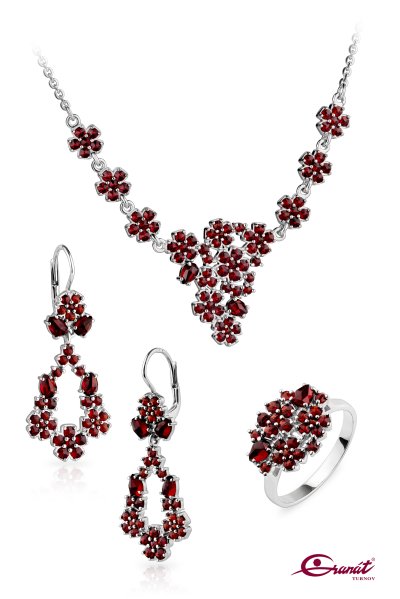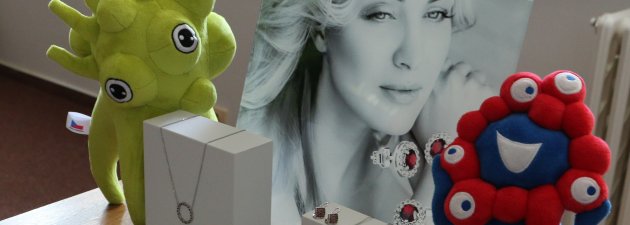"When we presented our jewelry collection at an exhibition in the Czech Embassy in Tokyo this spring, we were excited to see how many people were interested. Had it been a selling exhibition, there would be nothing to show the following day," says Pavel Tvrzník, chairman of the board of Granát, cooperative of artistic production based in Turnov. Granát has been preparing to enter the Japanese market for more than a year now.
Why Japan?
For Granát, the expansion to Japan is a logical step. Pavel Tvrzník recalls that they had a business partner there before the covid pandemic, with whom they worked successfully. Unfortunately, the partner retired and Granát couldn’t find a replacement during covid. "Still, we know that the Japanese love Czech garnets. They even sell imitations of our jewelry there. Our goal is therefore also to educate the Japanese not to buy these imitations, but our originals. Because it’s only the original that carries the exclusivity and quality they seek."
Every piece of jewelry from Granát Turnov thus comes with a certificate of origin, both in Czechia and abroad. "It is a branded product and we have our trademark registered in Japan as well. We have been planning to re-enter the market there for a long time and have already put a lot of effort into it."
These long and careful preparations are a prerequisite not only in Japan. Besides the trademark registration, Granát became a member of the Czech Chamber of Commerce and Industry in Japan (CCCIJ), and they have been extremely satisfied with their services. "Knowing the local environment is crucial and cooperation with the CCCIJ management – Mr. Watanabe and Mrs. Tomášková – proved to be the right choice in this regard. Last autumn, they already carried out a preliminary market survey for us, followed by the exhibition at the Czech Embassy in Tokyo. The Embassy has also helped us a lot and opened many doors. In Japan, references and personal contact are particularly important. Now we already have the first orders from Japanese customers and we believe that we will be getting more and will gradually build a network of stable business partners there, like we have in the USA, for example."
Czech market remains the most important
"Garnet is inherent to the Czech Republic, I dare say it is our national stone. That’s also why we sell most of our production in the domestic market, while exports only make up about ten to fifteen percent. We would like to increase the share of exports moving forward, which is also why we are active in Japan – and we are looking at other countries as well. However, Czech customers are pivotal for us," Pavel Tvrzník explains.
You will not find garnets with such unique properties anywhere else in the world. They were collected on the Czech territory as early as the fifth or sixth century. Then they started to be used more in liturgical objects during the reign of Charles IV and experienced glory under Emperor Rudolph II. However, the monarch who took the decisive step was Maria Theresa, who in 1762 banned the export of raw garnets from Czech lands, thereby protecting the domestic monopoly of garnet mining and processing. The popularity of garnet jewelry continued to grow domestically and beyond, and reached its peak during the Czech National Revival, when it became the mineralogical symbol of Bohemia.
Granát does not give up in times of crisis
The Turnov-based Granát cooperative, whose history began in 1953, is also one of a kind. "To my knowledge, there is no other jewelry company in the world that would cover such a wide portfolio of activities and professions as we do. We provide everything from garnet mining and processing to the design and creation of jewelry and custom production and sales. We sell our products both in our physical stores and online shop or through our wholesale business partners."
 The garnet is said to be a symbol of fire, blood, and pure heart. It can be argued that these qualities are also passed on to people who have connected their lives with Czech garnets.
The garnet is said to be a symbol of fire, blood, and pure heart. It can be argued that these qualities are also passed on to people who have connected their lives with Czech garnets.
"I have been with Granát for over thirty years. There have been various turbulences in our history, I have experienced worse and better times. However, the situation has never been as complex as it is today. Since the covid pandemic, we have been dealing with one crisis after another. In 2020, we had to close all our shops, our sales suddenly dropped by more than ninety percent, and we were staring into the abyss. We survived only thanks to the state support, which was a lifesaver for us then. However, we used up all of our reserves, cut the headcount from 220 to 160 employees and had to take out loans to be able to carry on."
"Paying back is not easy at all amidst the ongoing energy crisis and with the related overall inflation, costs are rising at an unprecedented rate. Meanwhile, the state isn’t making it much easier with a high tax burden and administration, having increased the fees for mining space and payments for mined minerals. Mining itself is a relatively energy-intensive activity, and we have already made all the energy savings possible. Since 2019, our energy costs have increased threefold and there are no more savings opportunities," says Pavel Tvrzník, adding that he believes that the situation will improve again and that Granát will have more breathing space.
When you visit one of their brick-and-mortar shops, walk through the Czech Garnet Museum in Prague's Karlova Street, or just browse their online store, you'll see that they really don't give up. To traditional products and serial production, they add unique handmade custom production, which means that they can make any piece of jewelry the customer thinks of, including from stones that the customer brings. On top of Czech garnets, Granát also works with moldavites, diamonds, and other precious stones. They show the same variability when it comes to gift items such as glass paperweights, gift pens, and imitations of the Czech crown jewels, to name a few.
Czech garnets and the jewelry that is made from them in Turnov are inherent to the Czech Republic and represent a national treasure that we should protect. Let's believe that they will be with us for another hundred years.
Written by Jana Jenšíková
Photo credits: Granát Turnov



